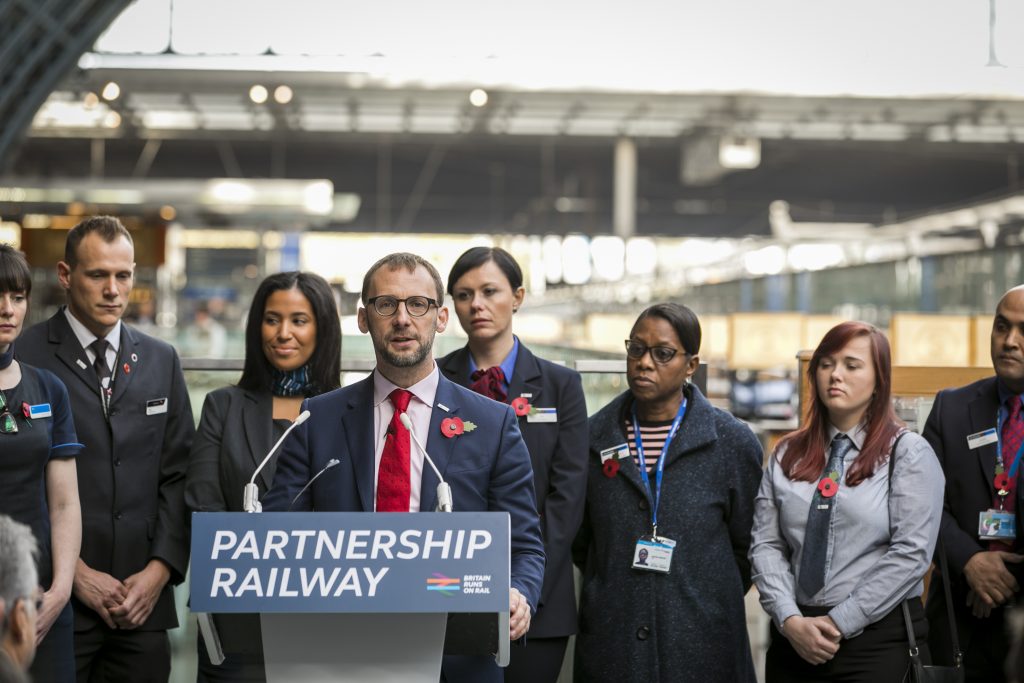Following a number of high-profile stories related to rail franchising, Paul Plummer, CEO of the Rail Delivery Group, says that the way in which these contracts are let and managed needs to change.
Train operators have played a crucial role in increasing rail usage over the past two decades. The number of services being run on our railway is up by over a quarter (28 per cent), customer satisfaction is the highest for a major railway in Europe, and there are more people employed (up by 47 per cent). Most importantly, we have one of the safest railways in the world.
This change, improvement and growth over the last twenty years means the railway is more important than ever to our economy. Independent analysis by Oxera shows this is worth £31 billion to the economy every year and record investment from the public and private sectors will secure further economic benefits of £85 billion while enabling further investment and improvement.
But the partnership railway of public and private sectors wants to do more. We think the way franchises are let and managed should be changed to enable this. And we’ve been working with governments and devolved authorities about making these changes.
This isn’t about whether the railway should be run by the public sector or private sector. We already have a partnership between both sectors with nearly £14 billion, of the more than £50 billion being invested into the early 2020s, coming from the private sector. And it’s entirely right that government specifies what the nation wants from the railway especially where this is funded partly by taxpayers.
Government should focus on the outcomes of a franchise, asking operators to make best use of the available space on the railway to ensure local needs are being met. This will better enable operators to focus on customers so that they can make best use of funding from fares as well as taxpayers.
Does it make sense for the government to specify, in a few hundred pages, every detail of the time the first train between two towns should be? Whether certain stations should be skipped every other service? Working together with aligned incentives, rail companies can deliver the services customers, communities and the economy require.
Like this story? Follow us on Facebook to keep up to date with rail industry news

Contracts must also be ready to take into account unpredictable events that can have an impact on the economy and on businesses in every sector. Last year, franchises lasting between seven and nine years were awarded. How many of us nine years ago, in 2009, would have predicted the world we’re in today? There needs to be flexibility in the system for events outside of the control of franchisees which mean that the assumptions during the franchise bidding process are no longer valid. This flexibility needs to be used for the benefit of customers and taxpayers.
One way of providing this flexibility is by allowing the train operator and government to agree to reset the franchise to meet the needs of customers. This could include train operators proposing to run new services, the government buying more services or changes to services when infrastructure upgrades are completed. This reset could also be used in the time between the franchise proposal being submitted and the franchise starting, which can be around a year. The potential for change in this period provides no value to customers but creates uncertainty for operators and therefore a cost to taxpayers.
And as the railway delivers benefits locally, as well as nationally, we think decision making about franchising should be devolved to local bodies. The outcomes which are specified will then respond to the needs of local communities. We can therefore learn from the franchises delivering major investment where there is devolution.
The decision for the East Coast franchise is short-term. The current system has functioned as expected to protect the taxpayer: the current operator has paid for the shortfall in predicted passenger revenue through the bond it provided to government. The bond has done its job. This would not have happened in a system without private sector involvement and the government would have had to fund any shortfall from taxes.
In the long-term, we must deliver on our plan through a public and private partnership to build a rail network that strengthens the railway’s contribution to the economy, keeps running costs in the black and frees up taxpayers’ money. We have started a dialogue with transport authorities about how we can change and improve franchising to deliver more for communities, customers, rail employees and the wider economy.
But this is just the start. We know the huge benefits and improvements the partnership railway can bring to the whole country if we get this right. So, as we engage with interested parties, we want to develop reforms that allow franchises to work better for Britain. Working together we can deliver a better railway for customers, communities, businesses and our people, for this generation and the next.
A version of this article originally appeared on the Rail Delivery Group’s blog.
Read more: Some Great Northern services could be transferred to London Overground

